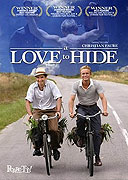Réalisation:
Christian FaureScénario:
Pascal FontanilleMusique:
Charles CourtActeurs·trices:
Jérémie Renier, Louise Monot, Bruno Todeschini, Nicolas Gob, Charlotte de Turckheim, Julij Tošev, Albena Stavreva, Julian Vergov, Thomas Suire (plus)Résumés(1)
Sara, Jean et Philippe ont entre vingt et trente ans en ce printemps 1942. Elle est juive. Ils sont homosexuels... En cette période d'Occupation où toutes les règles sont abolies, ils sont tous les trois habités par le même désir impérieux: survivre. Survivre malgré leur "différence", survivre parce qu'à leur âge on ne peut ni renoncer ni s'arrêter... jusqu'au jour où Jean, accusé à tort d'être l'amant d'un officier de la Wehrmacht, est déporté par les nazis. C'est le début de sa descente aux enfers sous le signe du Triangle Rose... (texte officiel du distributeur)
(plus)Critiques (1)
Watching A Love to Hide, I often thought of the British film Bent, which also depicted the situation of homosexuals during World War II, whose (still misunderstood) naturalness often earned them a one-way ticket to a concentration camp. The film has a somewhat slower pace, with everything seeming almost idyllic at first. A family can be really cruel, as Jean finds out the hard way. In addition to the forbidden relationship, the film also focuses on interpersonal relationships in general, addressing the issue of collaboration, human amorality and inhuman cruelty, so it has quite a broad thematic scope. It’s very hard to imagine what conditions were like at that time, and this TV film gives a believable testimony to that.
()
Photos (4)
Photo © Optimale

